There are many factors that underpin good decision making around the board table. One that receives little attention is how individual directors prepare for meetings. VUCA Trusted Advisors undertook a research project engaging with directors to gain a greater insight into how directors prepare for board meetings. The directors who participated were experienced with 75% having 2 or more board positions and 85% were professional (paid) directors.
The topic was initiated by an article by Martin Kriewaldt, Chair Central Petroleum published in the Australian Financial Review “the rule of thumb is that one reads board papers three times before a meeting, with some days between to allow for reflection.” 4 October 2019. While reading papers is clearly essential there are other components to preparation that underpin good decision making, such as additional research and preparation, seeking external advice, raising issues with the Chair, clarifying or seeking further information from the CEO or executive team, testing thinking with fellow directors, reflecting and ideation or innovative thought.
The results were positive, with 90% always reading their board papers. We gained some insights to why the 10% don’t always read their papers and why papers aren’t read multiple times. There was diversity with how deeply papers were read:
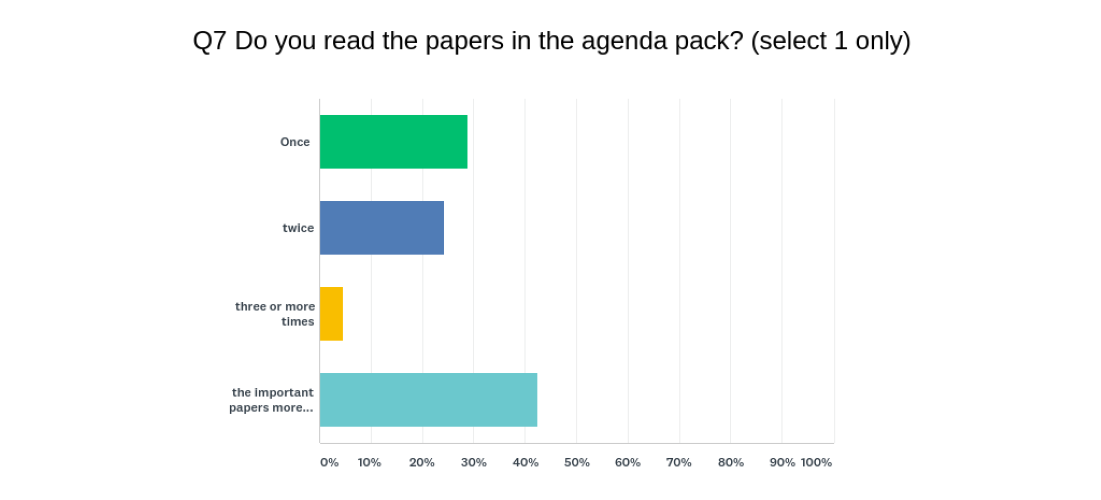
Nearly a third of directors are reading their board papers once and only 5% achieve Martin Kriewaldt’s standard of reading three times. Positively over 40% are reading the important papers multiple times.
If preparation is key to good decision making and it clearly is with 75% strongly agreeing with the statement ‘Thorough reading and understanding of the board papers contributes to robust discussion and informed decision making within Board Meetings’. Interesting, 30% of directors in our study believe their colleagues are not adequately prepared. So, what is holding Directors back from adequately preparing? The study identified 3 factors that impact on director’s preparation:
1. 8% are too busy to read the whole pack. Queue … Should I Stay or Should I Go, The Clash … if you are too busy to fulfil your legal and professional obligations it is time to consider, is this a short-term issue or if you should resign. Don’t be naïve, your colleagues know you are not prepared.
2. 4% claim it is due to the poor quality of the papers. Analysing this further, directors are underwhelmed with the quality of papers:
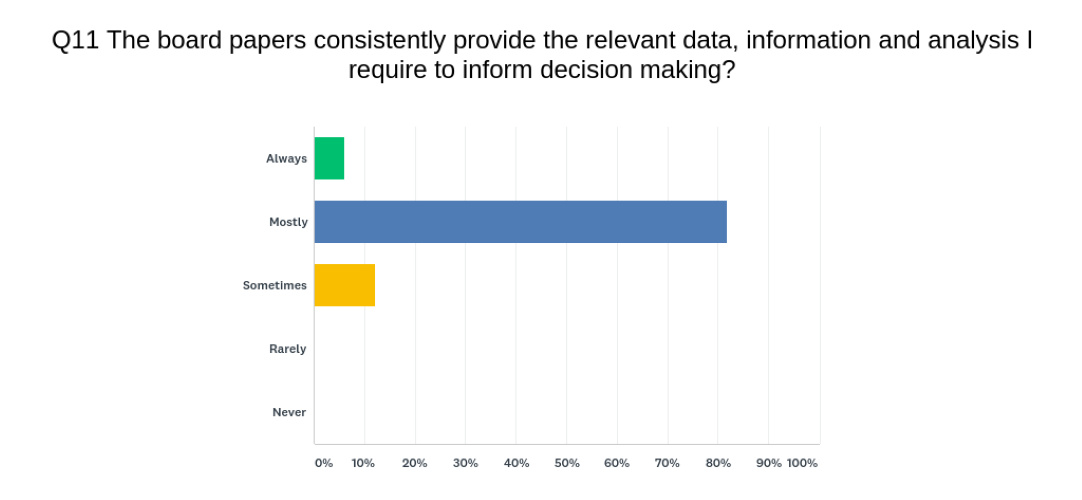
The results show 10% of directors are undertaking additional research and reading due to the poor quality of the board papers. Boards need to discuss and set the standard for board paper format and content and Chairs need to discuss the board’s expectation with their CEO. CEOs and Company Secretaries need to discuss information needs for important agenda items in advance of paper preparation so that the breadth of the issue is fully canvassed. For some important decisions understanding the information needs for good decision making is best done in prior meetings with the whole board.
“Major decisions should be preceded by presentations in the prior board meeting to ensure Board has had opportunity to question exec and ensure all questions are answered in the decision report.”
3. For 32% of directors the papers are sent too late (too close to the meeting) to have time to read them. Looking at this in detail it is concerning that the accepted standard of 7 days prior to meeting is only experienced by 49% of directors. Alarmingly 38% of directors receive their papers 3 or less days prior to their board meeting.
This is not best practise and it highlights why 30% of directors are only reading their papers once. Chairs need to set clear expectations with CEO, Company Secretary and executive team that board packs are to be sent 7 days prior to board meeting. With sufficient time directors can undertake additional preparation, research, seek external advice, clarify or seek further information from the CEO, avoid group think, test for unconscious bias and reflect on the content.
End of meeting reviews are not impacting on issues such as late papers. For 40% of directors their agendas include an end of meeting review but only 18% directors believe this makes a regular difference and for 19% it never does.
“The attitude of the Chair, i.e. does the chair drive the right behaviours and ensure papers are delivered a week prior and are relevant”
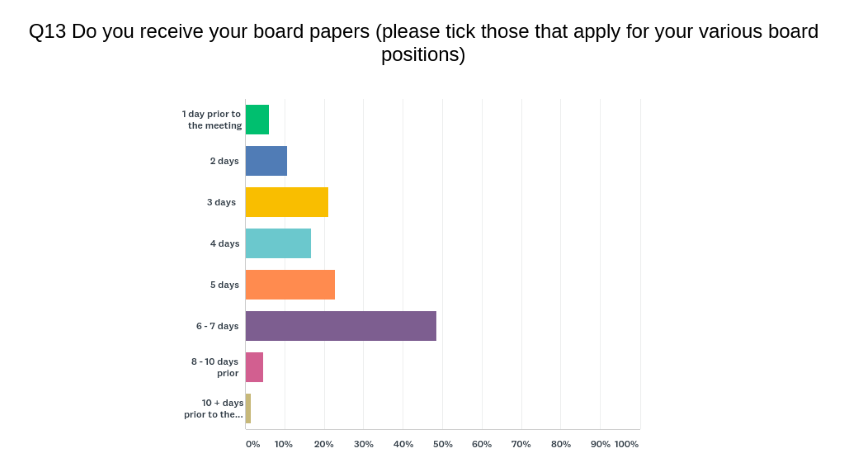
As an aside nearly 30% of directors are receiving their papers in hard copy. This is the most time consuming and expensive method of compiling and distributing papers. If you are receiving papers late consider moving to electronic delivery (email password protected document or shared drive or board app) which would speed up receiving the papers by 1 or 2 days.
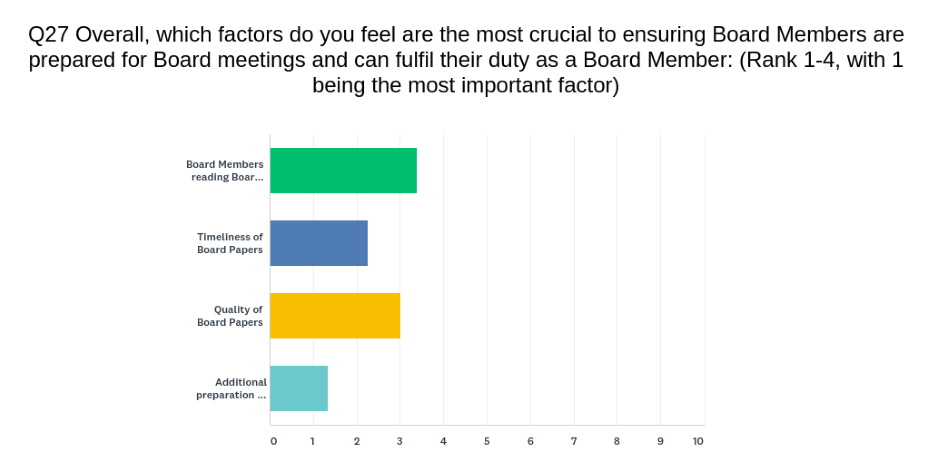
Directors do work hard. 96% undertake additional reading or research on topics in the board papers. Over 25% do this with some consistency. Alongside this, directors also regularly review past board papers with 60% doing this sometimes and 10% consistently.
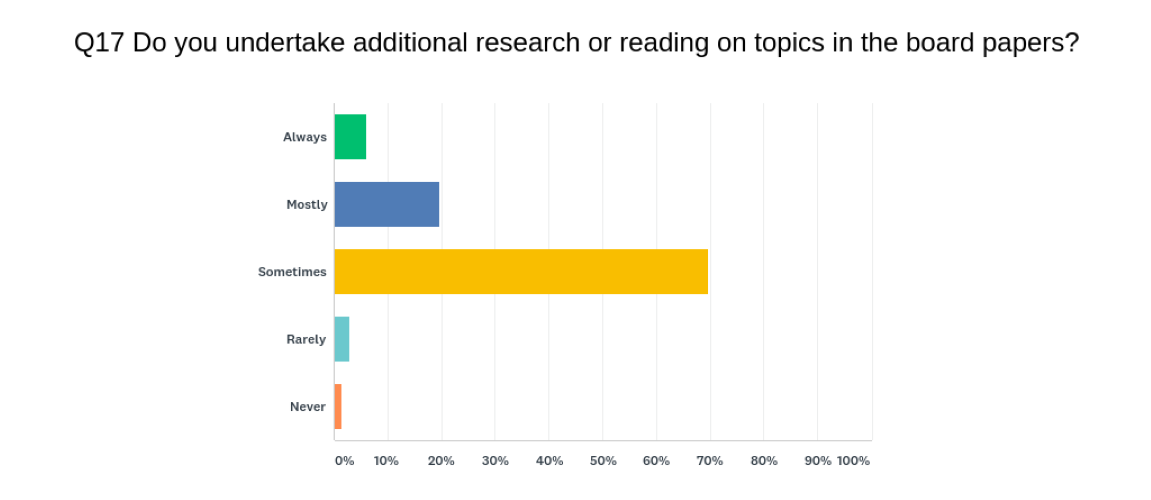
There are a number of reasons why directors undertake additional reading the most common (60% of directors) is ‘Self-directed learning to increase your own knowledge’. The feedback goes to heart of preparing for good quality decision making:
- Assist in formulating thoughts around the issue at hand.
- Checking to ensure consistency in the information or refreshing my memory.
- Additional research for me is usually analysis I think is needed to reach a decision/offer constructive input but which is missing from the papers. (Many papers are more descriptive than analytical.)
- Decision reports that are critical to the business deserve background research.
- Seeking alternative perspective and or evidence
- I am presenting new ideas or diverse perspectives and I deliver these with evidence
- Inform myself so I can form my own view and not solely rely on management’s summary.
Directors also contact the Chair, fellow directors and the CEO or executives as part of their preparation with 45% doing this sometimes. While testing your own thinking can be beneficial some caution is required with this to ensure the information provided is also available to all directors and that you are not engaging in lobbying for your position. 16% of directors regularly contact the Chair or other directors. There is a risk with this behaviour that decisions are being made or positions are being framed outside of the openness of the boardroom which can lead to factions and dysfunctional boards.
In summary, thoughtful director preparation underpins board decision making and innovative thinking. It is aided by reading the papers multiple times, having time to reflect, quality of the board papers, having sufficient time to undertake additional reading and research. Two factors that impinge on preparation – papers sent late and quality of papers – are in the hands of Chairs and boards to address. In the volatile, uncertain and ambiguous world directors operate in, preparation is critical to good decision making. Feedback from directors also highlights:
- Preparedness to listen to any additional information or views, focus on what it is the organisation wants from the Board i.e. quality recommendations that are specific in time and scope.
- The biography of board members, their breadth of experience and their developmental stage e.g. the ability to hold complexity and ambiguity and still remain mentally agile and creative.
For more information please contact Paul Geyer on paul.geyer@vuca.com.au
Paul Geyer FAICD
Director, VUCA Trusted Advisors

